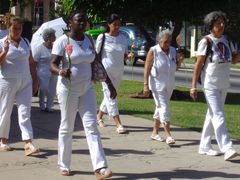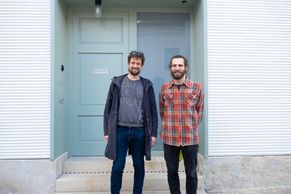Prague - Representatives of Cuban opposition see the recent decision of the EU to lift economic sanctions against the communist regime in their country as a "regretful step".
And the fact that the Czech Republic, long considered the most princliped defender of the pro-democracy activists in Cuba, lent its support for the reversal of the policy, is especially painful for them, Aktuálně.cz has learned.
The European Union imposed the sanctions on the Cuban regime in 2003 as a protest of the goverment´s imprisonment of more than 70 dissidents.
Three years ago, the sanctions were suspended and last week entirely removed.
"The decision to suspend the EU sanctions in 2005 was regretful enough," Miriam Leiva, one of the founding members of the activist group Damas de Blanco (Ladies in White), said to Aktuálně.cz in a phone interview.
Read more: Shooting of Damas de Blanco in guerilla conditions
"The Cuban regime now has got what it always wanted without having to do a thing," added Miriam Leiva, shooting down the notion that Raúl Castro, brother and successor of the long-time Cuban leader Fidel Castro, is steering the country towards more liberal future, as some observers are prone to believe.
"There are no changes taking place in Cuba. People are very tired," added Leiva who sees the decision as a "Spanish betrayal of the Cuban people," since it was above all Spain that was backing the move.
Miriam Leiva's husband, an independent journalist Oscar Espinosa, shares her resentment. Espinosa was imprisoned in 2003 for twenty years, however, after one year he was released because of health problems.
Rhetoric vs. reality
"The hardliners will interpret it [the EU's decision] as an affirmation of their approach," fears Espinosa.
Espinosa welcomes Cuba's signing two international treaties on human rights as well as Raúl Castro's remarks on his being ready to negotiate with the opposition. But, according to him, this is not enough.
"There is no real result coming out of this rhetoric. Repressions are still going on," insists Espinosa. "The political prisoners that were actually the reason for imposing the sanctions in the first place are still in jail. The Cuban government's position remains unchanged," he explained.
Another political activist imprisoned in 2003, a founder of the Liberal Democratic Party of Cuba, Osvaldo Valdés, said that "we have lost our faith in the European Union, all of the opposition is losing its faith in it."
Valdés too was released from prison due to his bad health and now lives in Sweden.
Schwarzenberg: Sanctions had no impact
Czech Foreign Affairs Minister Karel Schwarzenberg believes that after 2005 the sanctions have had no real impact.
Despite removal of the sanctions, he insists, there is still an important consensus on a common EU approach towards Cuba.
"First, every official state visit will meet the democratic opposition; second, EU will increase the pressure on Cuba to free political prisoners and enable international organizations to inspect their prisons," explained Schwarzenberg.
"And third, and most importantly, everything will be re-examined after one year," added the Czech foreign minister. Schwarzenberg also considers the Cuban dissent too fragmented.
Czechs change their minds
"The Czech Republic's support for the sanctions' removal is a bit painful for us," commented Valdés.
"I live in Sweden which together with the Czech Republic had been pushing for a harsher approach to Cuba. On the other hand, I understand these two countries face enourmous pressure from the rest of the 27 EU member states."
Valdés and Espinosa believe, however, that all the Cuban opposition is disappointed with the latest EU move.











